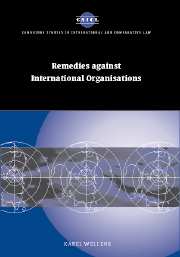Book contents
- Frontmatter
- Contents
- Acknowledgements
- List of abbreviations
- Introduction
- Part I General features of remedies against international organisations
- Part II Procedural aspects of remedial action against international organisations
- Part III Substantive outcome of remedial action against international organisations
- Part IV Alternative remedial action against international organisations and options for the future
- 16 Introduction to alternative remedial action against international organisations and options for the future
- 17 Pre-remedial action
- 18 Non-legal alternative remedial action
- 19 Amendment of existing judicial remedies
- 20 An inevitable role for the International Court of Justice
- Conclusion
- Bibliography
- Index
- CAMBRIDGE STUDIES IN INTERNATIONAL AND COMPARATIVE LAW
20 - An inevitable role for the International Court of Justice
Published online by Cambridge University Press: 13 July 2009
- Frontmatter
- Contents
- Acknowledgements
- List of abbreviations
- Introduction
- Part I General features of remedies against international organisations
- Part II Procedural aspects of remedial action against international organisations
- Part III Substantive outcome of remedial action against international organisations
- Part IV Alternative remedial action against international organisations and options for the future
- 16 Introduction to alternative remedial action against international organisations and options for the future
- 17 Pre-remedial action
- 18 Non-legal alternative remedial action
- 19 Amendment of existing judicial remedies
- 20 An inevitable role for the International Court of Justice
- Conclusion
- Bibliography
- Index
- CAMBRIDGE STUDIES IN INTERNATIONAL AND COMPARATIVE LAW
Summary
The multiplicity and infinite variety of their acts, actions and omissions taking place on a multilevel scale may result in international organisations becoming involved in differences or disputes with a wide range of non-state entities such as staff members, national and international non-governmental organisations, private enterprises and individuals; and as described in Part I of this study this may occur on the three levels of accountability. In Parts II and III I reviewed the procedural aspects and the substantive outcome of remedial action that could be undertaken by non-state entities and this was followed in chapters 18 and 19 by taking a closer look at the available non-legal alternative remedial mechanisms and the possible improvements to existing judicial ones. The time has now come to pay attention once more to those main actors on the international scene who naturally and inevitably run a much greater risk of finding themselves opposed to an international organisation in a difference or a dispute because of their permanent dealings with international organisations through their membership links or otherwise, namely states.
Within a membership framework states have at their disposal a wide range of political and legal remedial actions to render operational the accountability of the international organisation, although decreasing circles of differential standing depending on their additional status – for instance, being a host state to an international organisation's headquarters or to one of its operational activities – have been identified.
- Type
- Chapter
- Information
- Remedies against International Organisations , pp. 224 - 262Publisher: Cambridge University PressPrint publication year: 2002



